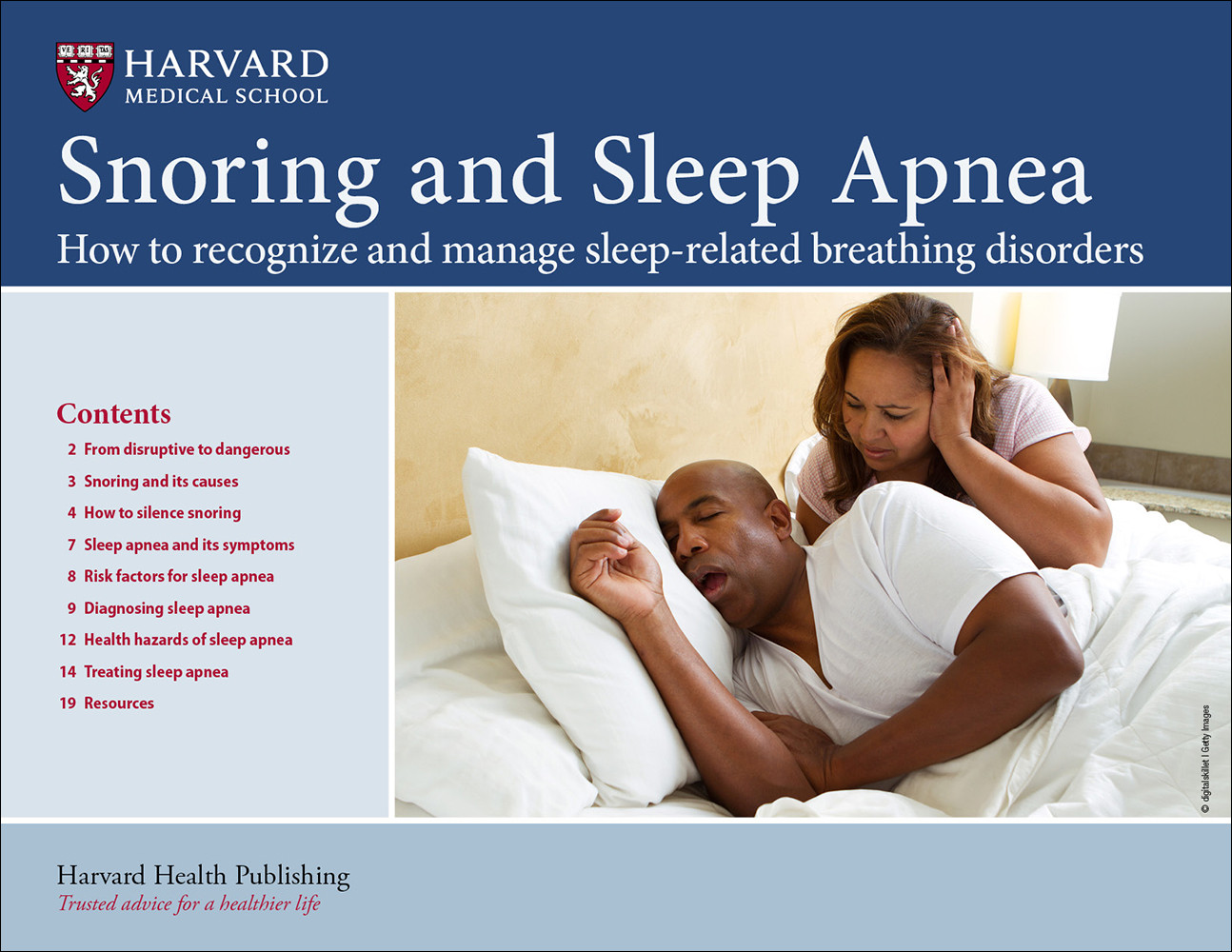Sleep apnea and heart disease: A weighty matter
In some people, obesity drugs may improve or even cure sleep apnea, a breathing disorder closely linked to cardiovascular problems.
- Reviewed by Christopher P. Cannon, MD, Editor in Chief, Harvard Heart Letter; Editorial Advisory Board Member, Harvard Health Publishing

In addition to helping control diabetes and obesity, the popular drugs known as GLP-1 agonists may also alleviate another disorder that's closely linked to cardiovascular problems: obstructive sleep apnea. This common condition — which is marked by brief pauses in breathing, often accompanied by loud snoring — doesn't just leave people groggy and sleepy during the day. Left untreated, this serious disorder raises the odds of high blood pressure, heart attack, and stroke.
Excess weight is the strongest risk factor linked with sleep apnea, which affects about 25% of men and 10% of women in the United States. More than half of people with the condition are overweight or obese, and the risk rises as body size increases, according to Dr. Sogol Javaheri, a sleep specialist at Harvard-affiliated Brigham and Women's Hospital. "Extra fat tissue in the neck and throat can narrow the airway, and extra weight on the chest and belly puts pressure on the lungs, which makes the normal process of inhaling and exhaling less effective," she explains.
What happens during sleep apnea?
The 10- to 30-second breathing pauses that characterize sleep apnea occur when the airway in your nose or throat becomes partially or completely blocked by large tonsils, a large tongue, or too much tissue in the airway. Image: © Blueastro/Getty Images |
Treating sleep apnea
In sleep apnea, the breathing pauses happen when the airway briefly closes (see "What happens during sleep apnea?"). The first-line treatment is positive airway pressure (PAP), which uses a small bedside machine to push a forceful stream of air to a mask covering the nose or the nose and mouth to keep the airway open.
A recent study found that one of the GLP-1 drugs, tirzepatide (sold as Mounjaro for type 2 diabetes and Zepbound for obesity) can slash the number of breathing interruptions during sleep — a key measure of sleep apnea severity. Published June 21, 2024, in The New England Journal of Medicine, the yearlong study included 469 people with obesity and moderate-to-severe sleep apnea, some of whom used PAP machines when sleeping. Compared with people who got a placebo injection, those treated with tirzepatide had a nearly 59% drop in their apnea-hypopnea index, a measure that describes the number of times a person's breathing slows or stops during an hour of sleep. Those taking tirzepatide lost close to 20% of their body weight.
Ditch your PAP machine?
"At least once a week, I see people in my clinic who have lost so much weight on one of the obesity drugs that they don't need to use their PAP machine any longer," says Dr. Javaheri. (The other GLP-1 obesity drug, semaglutide, is sold as Ozempic for diabetes and Wegovy for weight loss). "Several patients lost between 50 and 60 pounds, which was enough to completely cure their sleep apnea." While tirzepatide is not approved for treating sleep apnea, it's currently under consideration by the FDA for that use. However, even if you qualify for a prescription for either semaglutide or tirzepatide based on your medical conditions, these medications can be challenging to obtain due high demand, limited supplies, cost, and other factors.
That said, the growing list of health benefits from GLP-1 agonists (see "Anti-obesity drug lowers heart-related problems" in the February 2024 Heart Letter) may make them both more accessible and affordable in the future. If and when tirzepatide is approved for treating sleep apnea, sleep medicine clinics will likely provide the medication, says Dr. Javaheri.
Weight loss has long been recommended for sleep apnea sufferers who are overweight or obese. After people lose at least 10% of their initial weight (that is, their weight at diagnosis), insurance companies usually pay for another sleep study to see if they've improved enough to stop using PAP, which people often find cumbersome and inconvenient. "But I advise people using anti-obesity drugs to wait until they reach their goal weight before getting retested," says Dr. Javaheri.
Other contributors to sleep apnea
Finally, it's worth noting that obesity is just one of the factors that predispose people to sleep apnea, which also occurs in people who aren't overweight. "Some people are born with anatomical differences that leave them prone to sleep apnea, such as a narrow airway, a thicker neck, a large tongue, enlarged tonsils, or a small, receding chin," says Dr. Javaheri. "Smoking also increases the risk of sleep apnea significantly, and alcohol can cause sleep apnea or make it worse," she adds.
Image: © vitapix/Getty Images
About the Author

Julie Corliss, Executive Editor, Harvard Heart Letter
About the Reviewer

Christopher P. Cannon, MD, Editor in Chief, Harvard Heart Letter; Editorial Advisory Board Member, Harvard Health Publishing
Disclaimer:
As a service to our readers, Harvard Health Publishing provides access to our library of archived content. Please note the date of last review or update on all articles.
No content on this site, regardless of date, should ever be used as a substitute for direct medical advice from your doctor or other qualified clinician.

















